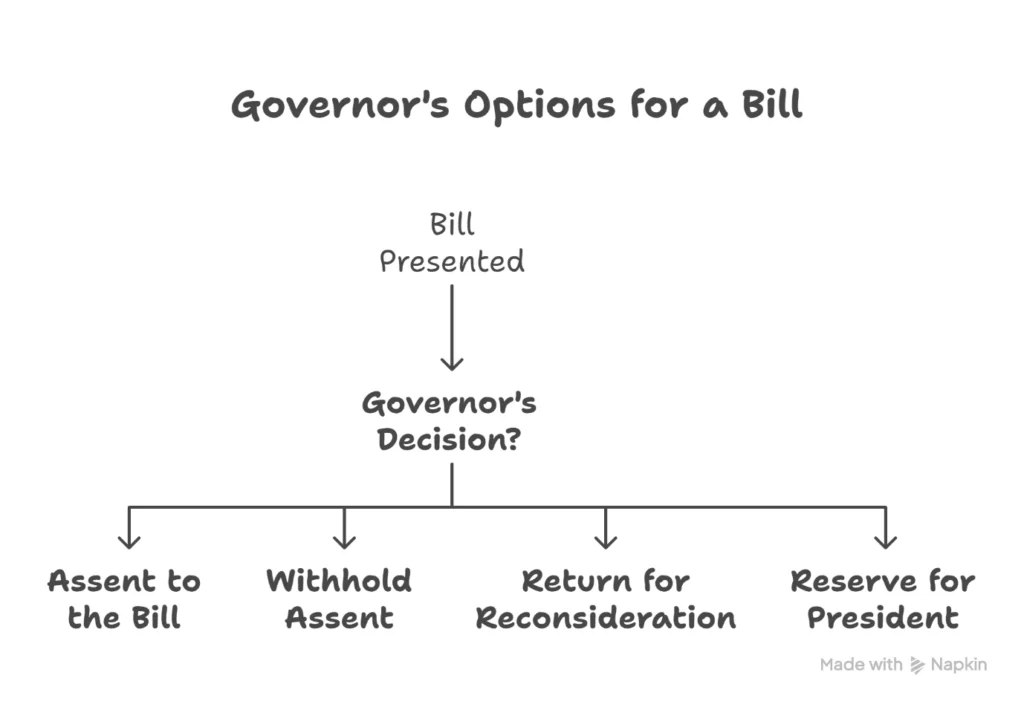Paper: GS-II, Subject: Polity, Topic: Judiciary and Tribunals, Issue: Presidential Reference regarding Article 200.
Context:
Supreme Court recently heard arguments on the Presidential Reference regarding Article 200 of the Constitution (Governor’s powers in giving assent to Bills). Court fixed a timeline of three months for Governors/President to decide on Bills submitted for assent.
Constitutional Position of the Governor in Bill Assent:
- Article 200: Governor has four options when a Bill is presented after passage by the State legislature:

Issue of Discretion:
- Article 200 is silent on the timeframe giving the Governor discretion to withhold the bill.
- Debate arises on whether Governor can act independently or only on the aid and advice of the Council of Ministers under Article 163.
Judicial Interpretations
- Shamsher Singh vs State of Punjab (1974): Governor’s discretionary power under Article 200 must be exercised on aid and advice of Council of Ministers, except in rare circumstances.
- The State of Tamil Nadu vs The Governor of Tamil Nadu & Anr. (2025): Court rejected idea of absolute discretion of Governor in withholding assent or reserving Bills indefinitely.
- Sarkaria Commission: Governors must act on aid and advice of Council of Ministers in normal circumstances.
Court’s Recent Ruling
- Time limit of three months fixed for Governors/President to decide on Bills.
- Removes uncertainty over Bills being kept pending indefinitely.
- Court clarified that constitutional balance between Union and State must be maintained.
Issues with Discretionary Powers
- Legislative Deadlock: Bills passed by State Assemblies stalled indefinitely.
- Political Misuse: Governors are accused of acting with partisan bias against State governments.
- Federal Tensions: Misuse of Article 200 undermines cooperative federalism.
- Judicial Ambiguity: Constitution does not prescribe a time limit, requiring judicial interpretation and judicial activism.
Implications of Supreme Court Intervention:
| Significance | Challenges |
| Ensures legislative process is not stalled.Prevents misuse of gubernatorial discretion.Promotes cooperative federalism and strengthens democracy. | May invite tension between judiciary and executive.Governors may still delay by returning Bills or reserving them for President.Federal frictions may persist if Centre-State relations remain politically adversarial. |
Way Forward:
- Codify Time Limits: Amend Articles 200 & 201 in the Constitution for clarity.
- Limit Governor’s Discretion: Narrow down Governor’s interpretation to avoid political misuse.
- Strengthen Federalism: Promote healthy Union-State coordination through regular dialogue.
- Parliamentary Oversight: Establish accountability mechanisms for Governors.
- Follow Sarkaria & Punchhi Commission Recommendations which clearly define Governor’s role as constitutional, not political.
Conclusion
The Supreme Court’s move to fix a three-month time limit is a landmark step towards protecting legislative sovereignty and preventing misuse of gubernatorial discretion. While not eliminating all ambiguities, it marks a decisive step towards strengthening constitutional governance and cooperative federalism in India.
La Excellence IAS Academy, the best IAS coaching in Hyderabad, known for delivering quality content and conceptual clarity for UPSC 2025 preparation.
FOLLOW US ON:
◉ YouTube : https://www.youtube.com/@CivilsPrepTeam
◉ Facebook: https://www.facebook.com/LaExcellenceIAS
◉ Instagram: https://www.instagram.com/laexcellenceiasacademy/
GET IN TOUCH:
Contact us at info@laex.in, https://laex.in/contact-us/
or Call us @ +91 9052 29 2929, +91 9052 99 2929, +91 9154 24 2140
OUR BRANCHES:
Head Office: H No: 1-10-225A, Beside AEVA Fertility Center, Ashok Nagar Extension, VV Giri Nagar, Ashok Nagar, Hyderabad, 500020
Madhapur: Flat no: 301, survey no 58-60, Guttala begumpet Madhapur metro pillar: 1524, Rangareddy Hyderabad, Telangana 500081
Bangalore: Plot No: 99, 2nd floor, 80 Feet Road, Beside Poorvika Mobiles, Chandra Layout, Attiguppe, Near Vijaya Nagara, Bengaluru, 560040
